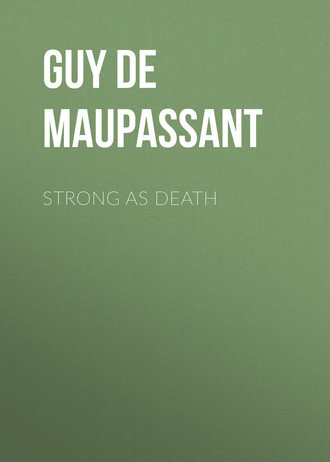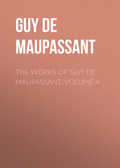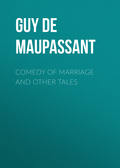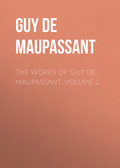
Ги де Мопассан
Strong as Death
Her reasoning was sensible. They could only agree upon that, and they decided to obey her.
She had risen, full of the thought of their departure, impatient to know that they were off and that she was left alone. Now, in order that she should commit no error during their absence, she listened, trying to understand perfectly, to remember everything, to forget nothing of the physician’s directions. The painter’s valet, standing near her, listened also, and behind him his wife, the cook, who had helped in the first binding of the patient, indicated by nods of the head that she too understood. When the Countess had recited all the instructions like a lesson, she urged the two men to go, repeating to her husband:
“Return soon, above all things, return soon!”
“I will take you in my coupe,” said the doctor to the Count. “It will bring you back quicker. You will be here again in an hour.”
Before leaving, the doctor again carefully examined the wounded man, to assure himself that his condition remained satisfactory.
Guilleroy still hesitated.
“You do not think that we are doing anything imprudent?” he asked.
“No,” said the doctor. “He needs only rest and quiet. Madame de Guilleroy will see that he does not talk, and will speak to him as little as possible.”
The Countess was startled, and said:
“Then I must not talk to him?”
“Oh, no, Madame! Take an armchair and sit beside him. He will not feel that he is alone and will be quite content; but no fatigue of words, or even of thoughts. I will call about nine o’clock to-morrow morning. Good-bye, Madame. I salute you!”
He left the room with a low bow, followed by the Count who repeated:
“Do not worry yourself, my dear. Within an hour I shall return, and then you can go home.”
When they were gone, she listened for the sound of the door below being closed, then to the rolling wheels of the coupe in the street.
The valet and the cook still stood there, awaiting orders. The Countess dismissed them.
“You may go now,” said she; “I will ring if I need anything.”
They too withdrew, and she remained alone with him.
She had drawn quite near to the bed, and putting her hands on the two edges of the pillow, on both sides of that dear face, she leaned over to look upon it. Then, with her face so close to his that she seemed to breathe her words upon it, she whispered:
“Did you throw yourself under that carriage?”
He tried to smile still, saying: “No, it was that which threw itself upon me.”
“That is not true; it was you.”
“No, I swear to you it was it!”
After a few moments of silence, those instants when souls seem mingled in glances, she murmured: “Oh, my dear, dear Olivier, to think that I let you go, that I did not keep you with me!”
“It would have happened just the same, some day or another,” he replied with conviction.
They still gazed at each other, seeking to read each other’s inmost thoughts.
“I do not believe that I shall recover,” he said at last. “I suffer too much.”
“Do you suffer very much?” she murmured.
“Oh, yes!”
Bending a little lower, she brushed his forehead, then his eyes, then his cheeks with slow kisses, light, delicate as her care for him. She barely touched him with her lips, with that soft little breath that children give when they kiss. This lasted a long time, a very long time. He let that sweet rain of caresses fall on him, and they seemed to soothe and refresh him, for his drawn face twitched less than before.
“Any!” he said finally.
She ceased her kissing to listen to him.
“What, my friend?”
“You must make me a promise.”
“I will promise anything you wish.”
“If I am not dead before morning, swear to me that you will bring Annette to me, just once, only once! I cannot bear to die without seeing her again… Think that.. to-morrow.. at this time perhaps I shall have.. shall surely have closed my eyes forever and that I never shall see you again. I.. nor you.. nor her!”
She stopped him; her heart was breaking.
“Oh, hush.. hush! Yes, I promise you to bring her!”
“You swear it?”
“I swear it, my friend. But hush, do not talk any more. You hurt me frightfully – hush!”
A quick convulsion passed over his face; when it had passed he said:
“Since we have only a few minutes more to remain together, do not let us lose them; let us seize them to bid each other good-by. I have loved you so much – ”
“And I,” she sighed, “how I still love you!”
He spoke again:
“I never have had real happiness except through you. Only these last days have been hard… It was not your fault… Ah, my poor Any, how sad life is!.. and how hard it is to die!”
“Hush, Olivier, I implore you!”
He continued, without listening to her: “I should have been a happy man if you had not had your daughter..”
“Hush! My God! Hush!.”
He seemed to dream rather than speak.
“Ah, he that invented this existence and made men was either blind or very wicked..”
“Olivier, I entreat you.. if you ever have loved me, be quiet, do not talk like that any more!”
He looked at her, leaning over him, she herself so pale that she looked as if she were dying, too; and he was silent.
Then she seated herself in the armchair, close to the bed, and again took the hand on the coverlet.
“Now I forbid you to speak,” said she. “Do not stir, and think of me as I think of you.”
Again they looked at each other, motionless, joined together by the burning contact of their hands. She pressed, with gentle movement, the feverish hand she clasped, and he answered these calls by tightening his fingers a little. Each pressure said something to them, evoked some period of their finished past, revived in their memory the stagnant recollections of their love. Each was a secret question, each was a mysterious reply, sad questions and sad replies, those “do you remembers?” of a bygone love.
Their minds, in this agonizing meeting, which might be the last, traveled back through the years, through the whole history of their passion; and nothing was audible in the room save the crackling of the fire.
Suddenly, as if awakening from a dream, he said, with a start of terror:
“Your letters!”
“What? My letters?” she queried.
“I might have died without destroying them!”
“Oh, what does that matter to me? That is of no consequence now. Let them find them and read them – I don’t care!”
“I will not have that,” he said. “Get up, Any; open the lowest drawer of my desk, the large one; they are all there, all. You must take them and throw them into the fire.”
She did not move at all, but remained crouching, as if he had counseled her to do something cowardly.
“Any, I entreat you!” he continued; “if you do not do this, you will torture me, unnerve me, drive me mad. Think – they may fall into anyone’s hands, a notary, a servant, or even your husband… I do not wish..”
She rose, still hesitating, and repeating:
“No, that is too hard, too cruel! I feel as if you were compelling me to burn both our hearts!”
He supplicated her, his face drawn with pain.
Seeing him suffer thus, she resigned herself and walked toward the desk. On opening the drawer, she found it filled to the edge with a thick packet of letters, piled one on top of another, and she recognized on all the envelopes the two lines of the address she had written so often. She knew them – those two lines – a man’s name, the name of a street – as well as she knew her own name, as well as one can know the few words that have represented to us in life all hope and all happiness. She looked at them, those little square things that contained all she had known how to express of her love, all that she could take of herself to give to him, with a little ink on a bit of white paper.
He had tried to turn his head on the pillow that he might watch her, and again he said: “Burn them, quick!”
Then she took two handfuls, holding them a few seconds in her grasp. They seemed heavy to her, painful, living, at the same time dead, so many different things were in them, so many things that were now over – so sweet to feel, to dream! It was the soul of her soul, the heart of her heart, the essence of her loving self that she was holding there; and she remembered with what delirium she had scribbled some of them, with what exaltation, what intoxication of living and of adoring some one, and of expressing it.
“Burn them! Burn them, Any!” Olivier repeated.
With the same movement of both hands, she cast into the fireplace the two packets of papers, which became scattered as they fell upon the wood. Then she seized those that remained in the desk and threw them on top of the others, then another handful, with swift movements, stooping and rising again quickly, to finish as soon as might be this terrible task.
When the fireplace was full and the drawer empty, she remained standing, waiting, watching the almost smothered flames as they crept up from all sides on that mountain of envelopes. They attacked them first at the edges, gnawed at the corners, ran along the edge of the paper, went out, sprang up again, and went creeping on and on. Soon, all around that white pyramid glowed a vivid girdle of clear fire which filled the room with light; and this light, illuminating the woman standing and the man dying, was their burning love, their love turned to ashes.
The Countess turned, and in the dazzling light of that fire she beheld her friend leaning with a haggard face on the edge of the bed.
“Are they all there?” he demanded.
“Yes, all.”
But before returning to him she cast a last look upon that destruction, and on that mass of papers, already half consumed, twisting and turning black, and she saw something red flowing. It looked like drops of blood, and seemed to come out of the very heart of the letters, as from a wound; it ran slowly toward the flames, leaving a purple train.
The Countess received in her soul the shock of supernatural terror, and recoiled as if she had seen the assassination of a human being; then she suddenly understood that she had seen simply the melting of the wax seals.
She returned to the wounded man, and lifting his head tenderly laid it back in the center of the pillow. But he had moved, and his pain increased. He was panting now, his face drawn by fearful suffering, and he no longer seemed to know that she was there.
She waited for him to become a little calmer, to open his eyes, which remained closed, to be able to say one word more to her.
Presently she asked: “Do you suffer much?”
He did not reply.
She bent over him and laid a finger on his forehead to make him look at her. He opened his eyes then, but they were wild and dazed.
Terrified, she repeated: “Do you suffer? Olivier! Answer me! Shall I call? Make an effort! Say something to me!”
She thought she heard him murmur: “Bring her.. you swore to me.”
Then he writhed under the bedclothes, his body grew rigid, his face convulsed with awful grimaces.
“Olivier! My God! Olivier!” she cried. “What is the matter? Shall I call?”
This time he heard her, for he replied, “No.. it is nothing.”
He appeared to grow easier, in fact, to suffer less, to fall suddenly into a sort of drowsy stupor. Hoping that he would sleep, she sat down again beside the bed, took his hand, and waited. He moved no more, his chin had dropped to his breast, his mouth was half opened by his short breath, which seemed to rasp his throat in passing. Only his fingers moved involuntarily now and then, with slight tremors which the Countess felt to the roots of her hair, making her long to cry out. They were no more the tender little meaning pressures which, in place of the weary lips, told of all the sadness of their hearts; they were spasms of pain which spoke only of the torture of the body.
Now she was frightened, terribly frightened, and had a wild desire to run away, to ring, to call, but she dared not move, lest she might disturb his repose.
The far-off sound of vehicles in the streets penetrated the walls; and she listened to hear whether that rolling of wheels did not stop before the door, whether her husband were not coming to deliver her, to tear her away at last from this sad tete-a-tete.
As she tried to draw her hand from Olivier’s, he pressed it, uttering a deep sigh! Then she resigned herself to wait, so that she should not trouble him.
The fire was dying out on the hearth, under the black ashes of the letters; two candles went out; some pieces of furniture cracked.
All was silent in the house; everything seemed dead except a tall Flemish clock on the stairs, which regularly chimed the hour, the half hour, and the quarter, singing the march of time in the night, modulating it in divers tones.
The Countess, motionless, felt an intolerable terror rising in her soul. Nightmare assailed her; fearful thoughts filled her mind; and she thought she could feel that Olivier’s fingers were growing cold within her own. Was that true? No, certainly not. But whence had come that sensation of inexpressible, frozen contact? She roused herself, wild with terror, to look at his face. It was relaxed, impassive, inanimate, indifferent to all misery, suddenly soothed by the Eternal Oblivion.






